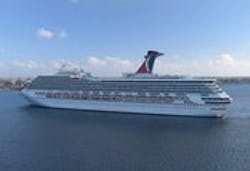Vancouver Democrats Want Stricter Cruise Dumping Regulations
Two federal New Democrats in Canada are demanding tougher regulations for the cruise industry to avoid pollution from dumping.
According to Canadian Press, New Westminster MP Peter Julian and Victoria MP Denise Savoie went in front of the Mercury at Vancouver's main cruise ship terminal and said that the changes brought in by the Conservative government to better protect Canadian waters from ship pollution are only voluntary guidelines and can not be enforced.
Julian pointed out that Washington, Alaska and California have stricter environmental regulations compared to Canada, where the oceans seem like a dumping ground for waste.
Julian feels that it is necessary to put an act in place to make sure the cruise ship lines that are environmentally responsible will have a competitive advantage.
In response to World Oceans Day last week, the Canadian Press reports that Savoie tabled a motion in the House of Commons for tougher regulations to deal with waste discharge and fuel content from cruise ships that would meet or exceed those in Alaska, Washington and California.
In November 2006, Washington fined Celebrity Cruises, Inc., $100,000 for allowing the cruise ship Mercury to dump 2,600 liters of untreated wastewater into Juan de Fuca Strait, between the state's Olympic Peninsula and southern Vancouver Island, a year earlier.
Even though the owners of the ship admitted to polluting Canadian water three times, they were not required to pay fines in Canada.
John Hansen, president of the Northwest Cruise Ship Association, a not-for-profit association representing the major cruise lines operating in the Pacific Northwest, Canada, Alaska and Hawaii, did not return calls about the MPs' demands.
Ross Klein, a professor in the school of social work at Memorial University of Newfoundland, informed Canadian Press that a cruise ship produces about 341,000 liters of grey water per person every day, which accumulates from sinks, showers and the galley.
Most of the waste is treated by a marine sanitation device, but this is an older technology that isn’t used frequently in British Columbia. There are advanced wastewater treatment systems, but these systems kill coral reeves and don't effectively deal with some metals including zinc, nickel and copper.
Source: Canadian Press
